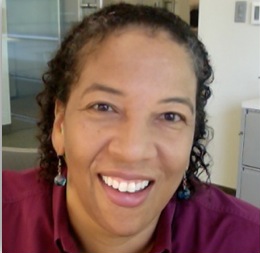Dawn Wright facts for kids
Quick facts for kids
Dawn Wright
|
|
|---|---|
 |
|
| Born | April 15, 1961 |
| Education | Wheaton College (BS) Texas A&M University (MS) University of California, Santa Barbara (PhD) |
| Scientific career | |
| Fields | Geography, Oceanography |
| Institutions | Esri Oregon State University |
| Doctoral advisor | Raymond Smith |
| Other academic advisors | Michael Frank Goodchild Kenneth C. Macdonald Rachel Haymon |
Dawn Jeannine Wright, born on April 15, 1961, is an amazing American scientist. She is a geographer and an oceanographer. This means she studies the Earth's surface and its oceans. She is a top expert in using special computer maps, called geographic information system (GIS), to understand oceans and coastlines. She even helped create the first GIS map for the oceans!
Dr. Wright is the Chief Scientist at a company called Environmental Systems Research Institute (Esri). She has also been a professor at Oregon State University since 1995. She was even named Oregon Professor of the Year once! Dr. Wright made history as the first Black woman to dive deep into the ocean in a special submarine called ALVIN. On July 12, 2022, she became the first and only Black person to dive to Challenger Deep. This is the deepest part of the ocean on Earth! During that dive, she successfully used a special sonar device to map the ocean floor.
Contents
Early Life and School
Dawn Wright loved learning from a young age. She earned her first degree in geology from Wheaton College in 1983. Geology is the study of Earth's rocks and how they are formed.
Later, she studied the ocean. She received a master's degree in oceanography from Texas A&M University in 1986. Oceanography is the study of the ocean. Then, she earned her Ph.D. from the University of California, Santa Barbara in 1994. Her Ph.D. focused on physical geography and marine geology. In 2007, her old university, UCSB, gave her a special award for her achievements.
Her Work and Discoveries
Dr. Wright's research helps us understand the ocean floor. She maps areas where the seafloor is spreading apart and studies coral reefs. She uses geographic information systems (GIS) to analyze the marine environment. GIS is like a super-smart mapping tool that helps scientists see patterns and connections in data.
She helped write one of the first books about using GIS for the ocean. Many people see her as one of the most important researchers in her field.
Early in her career, from 1986 to 1989, Dr. Wright worked on a research ship called the JOIDES Resolution. She sailed on ten different trips, each lasting two months, mostly in the Indian and Pacific Oceans. She helped with the Ocean Drilling Program, which collects samples from deep under the seafloor.
Dr. Wright also helps guide important science groups. She has been part of the National Academy of Sciences Ocean Studies Board and advised groups like NOAA and the EPA. She strongly supports STEM education. STEM helps young people learn about science, technology, engineering, and math. She also believes in sharing science with everyone. She has been featured in many magazines and on radio shows, inspiring others.
In 2018, Dr. Wright appeared in a short film series called "Let Science Speak." This film was shown at the Tribeca Film Festival.
Awards and Special Honors
Dr. Dawn Wright has received many important awards for her work. She is a member of the National Academy of Sciences, the National Academy of Engineering, and the American Academy of Arts and Sciences. These are very high honors for scientists. She is also a fellow of the American Association for the Advancement of Science.
Here are some of her other awards:
- NCSE Friend of the Planet Award (2024)
- Distinguished Alumni Award from UC Santa Barbara
- Fellow of The Oceanography Society (2020)
- Geosciences Innovator Award from Texas A&M University College of Geosciences (2019)
- Fellow of the California Academy of Sciences (2018)
- Steinbach Visiting Scholar at MIT/WHOI (2018)
- Roger Revelle Commemorative Lecturer for the National Academy of Sciences (2017)
- Fellow of the Geological Society of America (2016)
- Randolph W. “Bill” and Cecile T. Bromery Award for Minorities from the Geological Society of America (2015)
- Leptoukh Lecture Award from the American Geophysical Union (AGU) (2015)
- Distinguished Teaching Honors from the American Association of Geographers (2013)
- Presidential Achievement Award from the American Association of Geographers (2012)
- Milton Harris Award for Excellence in Basic Research from OSU (2005)
- NSF CAREER Award (1995)
Selected Publications
Dr. Wright has written almost 100 articles for science journals and 12 books. These publications share her research and discoveries with other scientists around the world.
Diversity and Inclusion
Dr. Wright cares a lot about making science open to everyone. She is part of the American Geophysical Union's Diversity and Inclusion Advisory Committee. She also supports and takes part in the Black in Marine Science organization. This group helps encourage Black people to get involved in marine science.
See also
- List of people who descended to Challenger Deep
 | DeHart Hubbard |
 | Wilma Rudolph |
 | Jesse Owens |
 | Jackie Joyner-Kersee |
 | Major Taylor |

